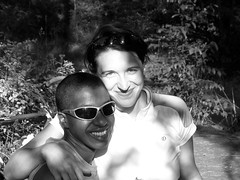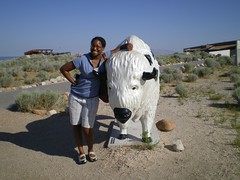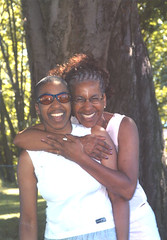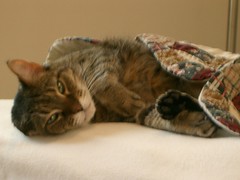One of the prompts for the third of our four essays due in writing class, was to write about where you're from and who you are, and to answer questions such as:
How one perceives oneself within and outside of a community and culture. How have you dealt with assumptions about each culture? What assumptions do people have about you? How have you handled these situations? To what extent have you embraced or resisted stereotypes?
Well, it's kind of a no-brainer, this prompt. Obviously, I could write about being a black gay girl in a straight white world--but I really didn't want to. I desperately wanted to write about something 'more upbeat.' On the day that we spent time in class brainstorming our topics, I made the mistake of mentioning my dilemma to a classmate:
As I attempted to express my frustration with the demographic make up of my home town, my classmate hastened to reassure me by saying how much worse things were in her home town in the Midwest, where 'the N word' can still be heard on a regular basis. I took a deep breath, and tried to explain to her, the subtle forms of racism which are not necessarily any easier to deal with, precisely because they can be so hard to pin down. “You know, I've heard that from other people,” she replied.
I ended the conversation at that point, before I officially became the 'angry black girl.' Her response was a red flag to me that those 'other people' were most likely people of color. It is common for people in a dominant group to not actually hear something that is said about their privilege, unless it is coming from someone in their group. If my classmate had actually internalized what those 'other people' had told her, perhaps she would not now be responding to my experience by telling me how grateful I should be that things are 'so good in Portland,' compared to where she is from. As if Portland had figured it all out, despite having a history of racist laws in the Oregon constitution until 1959. Her comment was completely inappropriate, for the same reason it would be unseemly to suggest to a paraplegic that they should be grateful they're not a quadriplegic.
Well, after that, I really felt like I had to write it, if only to give her a clue, and deal with my frustration. But now I was pissed off, defensive and wary. The next class, Joan, the teacher, asked us to go around and share our topics. I didn't really feel like talking about it at that point, so I just said something vague about 'not fitting in.'
"Oh yes, there's a whole area of research on that," Joan said excitedly. "Outsider/insider syndrome." She then went on with some story about going to a little town to do research and how she experienced the same thing. But I wasn't in the mood for "I know just how you feel!" coming from a straight, white, middle class woman just then. She felt me too, because at the break, she ran right over to me. "I just wanted to check in--I don't feel like I answered your question."
"I wasn't asking a question." I told her that I was feeling guarded about my topic, and that I wasn't going to workshop it in class. She panicked then, thinking she'd done something to offend me, so I had to reassure her that it wasn't her.
I worked on it over the weekend, starting over completely three days before it was due, because the first one had just turned into a rant about everything that had ever pissed me off. Not very useful. When I was done, I sent it to my WBPs (Weird Black People's) and they all wrote back with virtual head-nods that yes, I'd gotten it right.
The next class, I pulled S (my new metro straight, white boy-friend who loves the lesbos), and L (the other lesbo in class) into the hall and gave it to them. "You're the first ones to see this in this class," I told them.
"You're gonna give it to us crackers eh?" S joked. I wasn't worried though and we ended up meeting after class at Cup and Saucer and they gave me some good grammar feedback, and generally said they loved it. L kept saying how she wished I was in her diversity class the year before, where all the black people were straight and all the gay people were white. And one of the black women basically had the attitude of, 'let's take care of us (black folks) and then we'll get to you.' Yeah, that strategy wouldn't really work for me.
"You need a hotline," I told L, "so you can dial it up when you need a queer person of color to come and call bullshit on everybody. I'm envisioning a nice outfit with a cape of some sort. Maybe an invisible plane. You could have different extensions depending on which race you need."
Before I left, I said, "Now watch, we'll get them back next week and Joan will ask me to read it in class."
Fast forward to this morning. I walked in late, and Joan was giving a lecture about run-on sentences. I guess the latest crop of essays wasn't quite up to snuff in the grammar department. That got me worried. Grammar isn't really my best thing, and doing things last-minute doesn't help. But after her diatribe, she came over and handed me my essay and a quick scan revealed all 4's--her grading system is three numbers from 1-4 for concept, development of idea, and execution. "Beautiful essay," was her comment.
Well, good, I hadn't twisted my guts out for nothing at least. But the best was yet to come.
"I would love to have Dean and Kronda read parts of their essays, if you're willing." She looked at me.
I debated. S and L, sitting next to me, knew better than to offer advice. Of course it would suck to sit there and read my angry black girl manifesto to a room full of unknown white people. But really, why had I written it, if not for this very moment, to call out my well meaning, but clueless classmate and make her listen? I said yes.
I let Dean go first, enjoying his letter to his 'maybe, someday' child. Then it was my turn.
I was expecting it to be challenging, but I hadn't bargained on just how hard it was. I started crying in the middle of page two and didn't stop until class was over. Oh, so it's going to be like that eh? Crap. The worst part was when I got to the conversation (quoted above). I was crying too hard to make sentences anymore and had to stop for a long moment. I didn't look up, but I could imaging how much discomfort I was causing in the room. Well, why should I be the only one? I heard Joan start to say something, but I ignored her and continued. Wow, I guess that really got to me. I wasn't trying to be a drama queen, and I certainly don't like crying in front of a big group of people staring at me, but it wasn't the first time and it would be over soon. If showing these strangers my pain helped make my point (and got a certain person to listen), then it was worth it.
I settled into an acceptable level of crying that would still allow me to speak, and kept going. All was well until the very end, when I started choking up again. Come on, you've only got three sentences, suck it up! Another long deep breath, and I was done. I felt like I'd just finished biking up Larch Mountain.
I sat and wiped my face on my sleeve, grateful it was cool enough to warrant long sleeves today.
M, chimed in first. She was in the workshop group when I refused to talk about it. But they pestered me, so I told them a little bit, to which she and B (from Forest Grove, a suburb about 30 miles from Portland) replied, "Wow, we never thought of that." Yeah, why would they? I don't remember exactly what she said, except that it was sweet, that she was thankful that I shared, considering I didn't even want to talk to three people about it, and now I had dismantled myself for the whole class--and she said that "anyone with ears should hear this," which is possibly the nicest compliment on my writing, ever.
Another woman (name forgotten) chimed in with more nice words and said she hopes I find a way to get it published (general consensus). And Dean, Irish, forceful, loud, all-about-me Dean, complimented the 'quality of the writing' and said my tone was 'just right.'
Joan, who admits she spends hours trying to find just the right words for everything, was amazed that I had written the whole thing in a week (less, really). "I can't do that. You have a rare gift."
But the best comment was the one that didn't come: my classmate was silent, and looking *very* pensive, which is exactly what I hoped for. Maybe she actually listened. Maybe she'll think twice before she says something stupid to the next black person she meets. Maybe she finally heard me. If that's true, then I'll take, 'slicing your heart open and bleeding all over your sleeve,' for the win.







1 comment:
Congratulations, Kronda! I hear the immense pain in your blog as well as the critical - and many - moments where you ripped off that scab and let your blood bleed all over your classmates. And blood is life-giving and has so many nutrients. They - and we - are better people for it...and it still sucks b/c it's not your job to blood-let for anyone (unless of course you want to). Thanks so much for meta-sharing!
Post a Comment